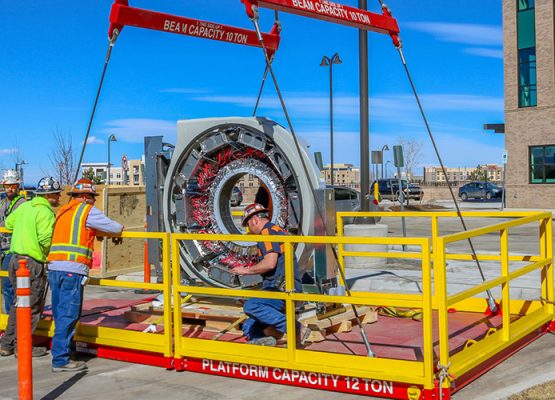What Does the HSE Department Do?

- June 18, 2025
Why is the HSE Department Essential in the Heavy Equipment Industry?
The heavy equipment industry, especially in sectors like construction, mining, and oil and gas, comes with its fair share of risks. That is why we have established a dedicated Health, Safety, and Environmental (HSE) department to ensure the safety of our workers and maintain compliance with environmental standards. At RMS Cranes, we take health, safety, and environmental compliance very seriously. That is why we have put together some information outlining what the HSE department does and why it is so crucial to our overall operations and success.
Learn some helpful rigging inspection and maintenance tips ➞
The HSE department is responsible for a wide range of tasks that help minimize risks and protect everyone on the job site. Here is a look at the key responsibilities of our HSE department and how they impact our daily operations:
1. Ensuring Worker Safety
One of the primary roles of the HSE department is to ensure the safety of our employees, contractors, and anyone else onsite. This includes providing safety training, conducting regular safety inspections, and enforcing safety standards. In situations that involve lift planning for complex projects, the HSE team works closely with engineering and operations to verify that all lifting procedures follow strict safety protocols.
2. Managing Environmental Compliance
The HSE department also plays a vital role in managing environmental issues. Whether it is monitoring emissions from heavy equipment or ensuring that hazardous materials are stored and disposed of properly, the department ensures that our team complies with environmental regulations. This helps reduce the environmental impact of our operations and maintains a sustainable approach to our work.
3. Risk Assessment and Hazard Mitigation
A big part of the HSE department’s job is to assess potential hazards on job sites before work begins. This includes evaluating the terrain, weather conditions, and any other factors that could pose a risk. For a crane operator, these assessments are critical in determining safe load limits, rigging methods, and lift paths.
4. Continuous Safety Improvement
The HSE department also focuses on continuous improvement. They gather feedback from workers, monitor safety performance, and stay updated on industry best practices and new safety technologies. This ongoing focus on safety helps ensure that our team remains at the forefront of safety practices in the lifting and moving industry.
At RMS Cranes, the HSE department is an essential part of our team, ensuring that we meet all safety and environmental standards while providing the best service possible to our clients. By prioritizing safety, we are able to deliver efficient and reliable crane services to industries like construction, renewable energy, and more. Visit our website to learn more about our commitment to health, safety, and the environment.
Related Blogs

- August 28, 2024
Rigging Inspection & Maintenance Tips
Rigging Inspection & Maintenance Tips Rigging equipment is critical in various industries, from construction and manufacturing.

- January 30, 2025
Safety Measures When Operating a Rental.
Safety Measures When Operating a Rental Crane Operating a rental crane requires a meticulous focus on.

